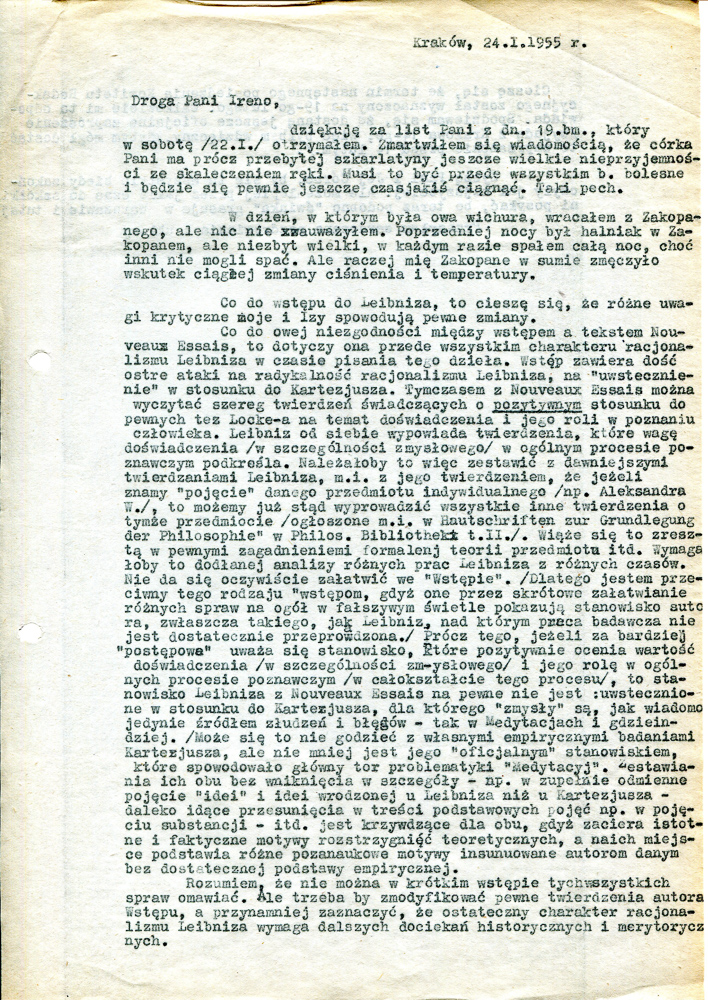

Letter to Irena Krońska written in 24.01.1955
v v v Krakow, 1/24/1955
v Dear Ms. Irena,
v v thank you for your letter from the 1/19 which I received on Saturday /the 22nd /. I was truly upset by the news that, apart from the scarlet fever, your daughter still had such great troubles with her hand injury. It must first of all be very painful and will probably last for some time. Such bad luck.
v v On the day of the storm, I was returning from Zakopane, but did not notice anything. There was a foehn wind in Zakopane the night before, but not a very strong one, at least I slept the night through, although others had trouble sleeping. But it was rather Zakopane that got me tired because of the constant change in pressure and temperature.
v v As for the introduction to Leibniz, I am glad that my and Iza’s various critical remarks will effect some changes.
v v As for the discrepancy between the introduction and the Nouveaux Essais text, it first of all concerns the nature of Leibniz’s rationalism as it was during writing this work. The introduction contains sharp attacks on the radicalism of Leibniz’s rationalism, on its “retardation” in relation to Descartes. Meanwhile, in Nouvaux Essais one can read a number of statements testifying to a positive attitude to some of Locke’s theses about experience and its role in human cognition. Leibniz himself makes statements that emphasize the importance of experience /particularly sensual/ in the overall cognitive process. It should therefore be compared with Leibniz’s earlier statements, including his assertion that if we know the “concept” of an individual object /e.g. Aleksander W./, we can derive from it all other claims about said object /announced e.g. “in Hautschriften zur Grundlegung der Philosophie” in Philos. Bibliothek vol. II./ This is connected with some issues of formal theory of the subject, etc. It would require an analysis of various Leibniz’s works from different periods. Of course it is impossible to do that in the “Introduction”. /That is why I am opposed to such “introductions”, as they, by briefly settling various matters, usually falsely present the position of the author, especially one such as Leibniz, research of whom has yet to be fully concluded./ Besides, if a position that positively assesses the value of experience /particularly physical/ and its role in the general cognitive process is considered “progressive” /in the overall process /, then of Leibniz’s position expressed in Nouveaux Essais is certainly not “retarded” in relation to Descartes, for whom “senses” are, as we know, only a source of illusions and errors – both in Meditations and his other works.
/ This may not reconcile with Descartes’s own empirical research, but it is, nonetheless, his “official” position, which gave birth to the central subject matter of “Meditations”. Comparing them both without going into details – e.g. the completely different concept of “idea” and innate idea in Leibniz and Descartes – far-reaching shifts in the content of basic concepts such as the concept of substance – etc. would be unfair to both, as it blurs the actual and important motivations of the theoretical solutions, and replaces them with various non-scientific motivations ascribed to given authors without a sufficient empirical basis.
v v I understand that you cannot discuss all these matters in a brief introduction. But one should modify some claims of the author of the Introduction, or at least point out that a final understanding of the nature of Leibniz’s rationalism requires further historical and substantive research.
I am glad that the date of the next meeting of the Editorial Committee was set for February 19th. It completely agrees with me. I expect that I will still be receiving an official invitation /I leave Krakow on the 14th, so I would be grateful if I could get an invitation before February 14/.
v v I wish both you and your daughter that all your miseries end as soon as possible. But maybe it would be better not to send her to the school for some time, because now it seems that mumps is now raging in Warsaw and here
v v I send you my cordial greetings and bows
